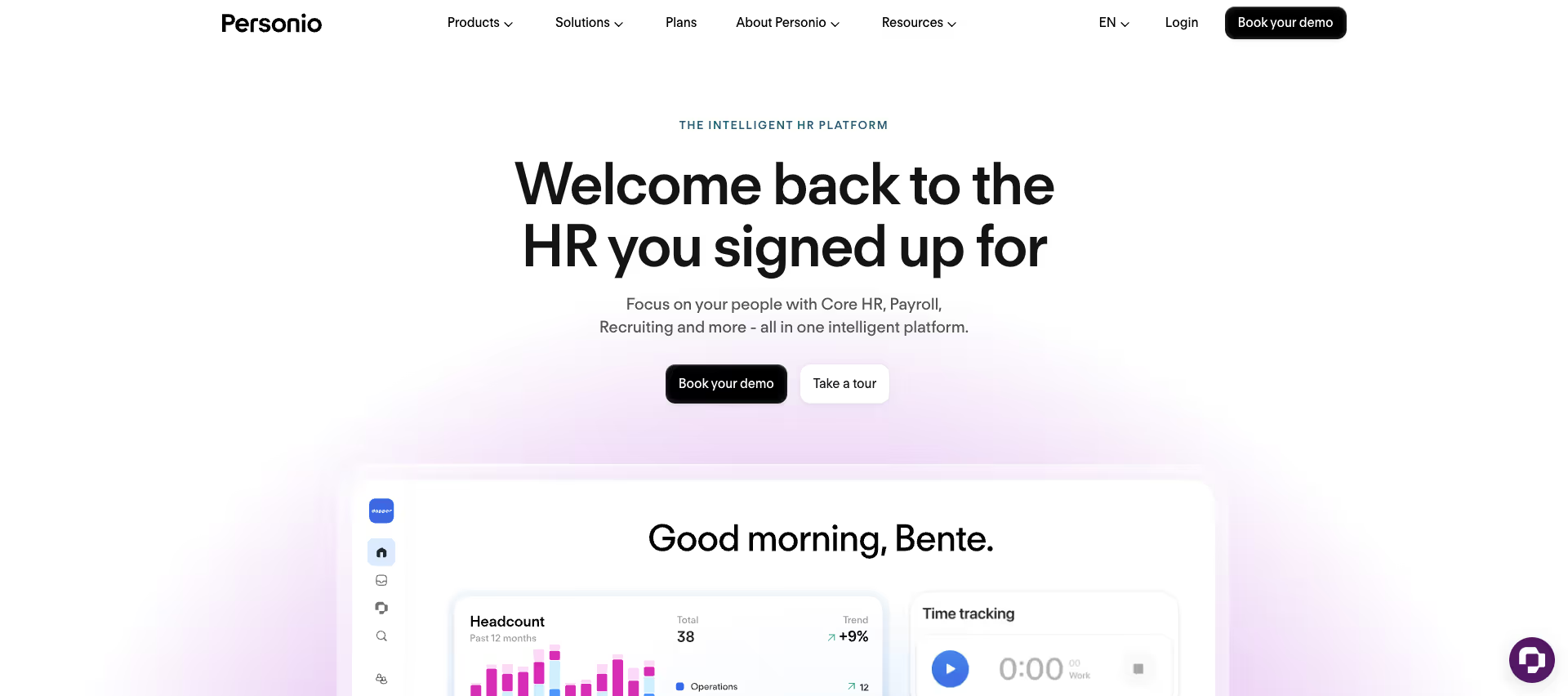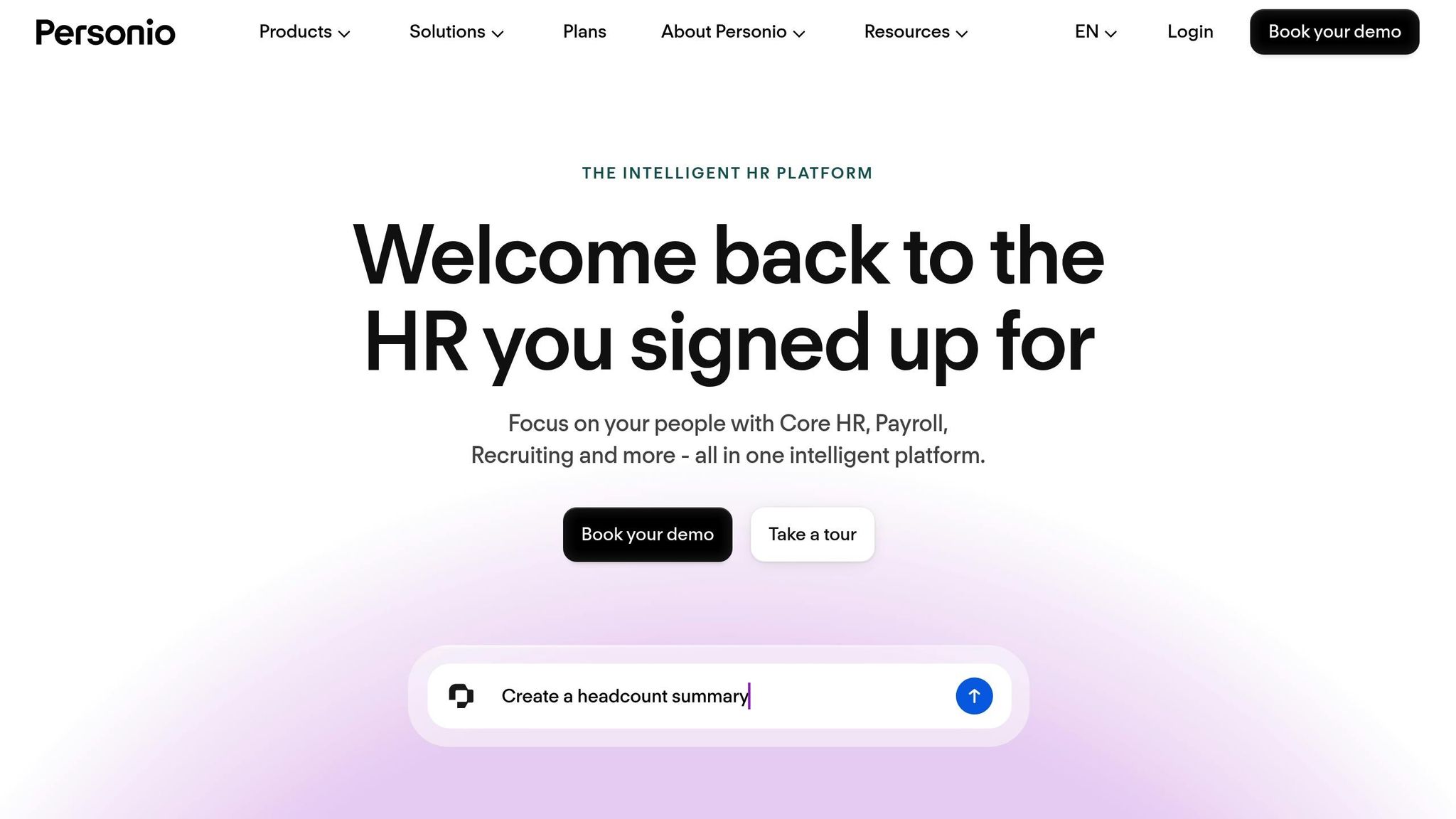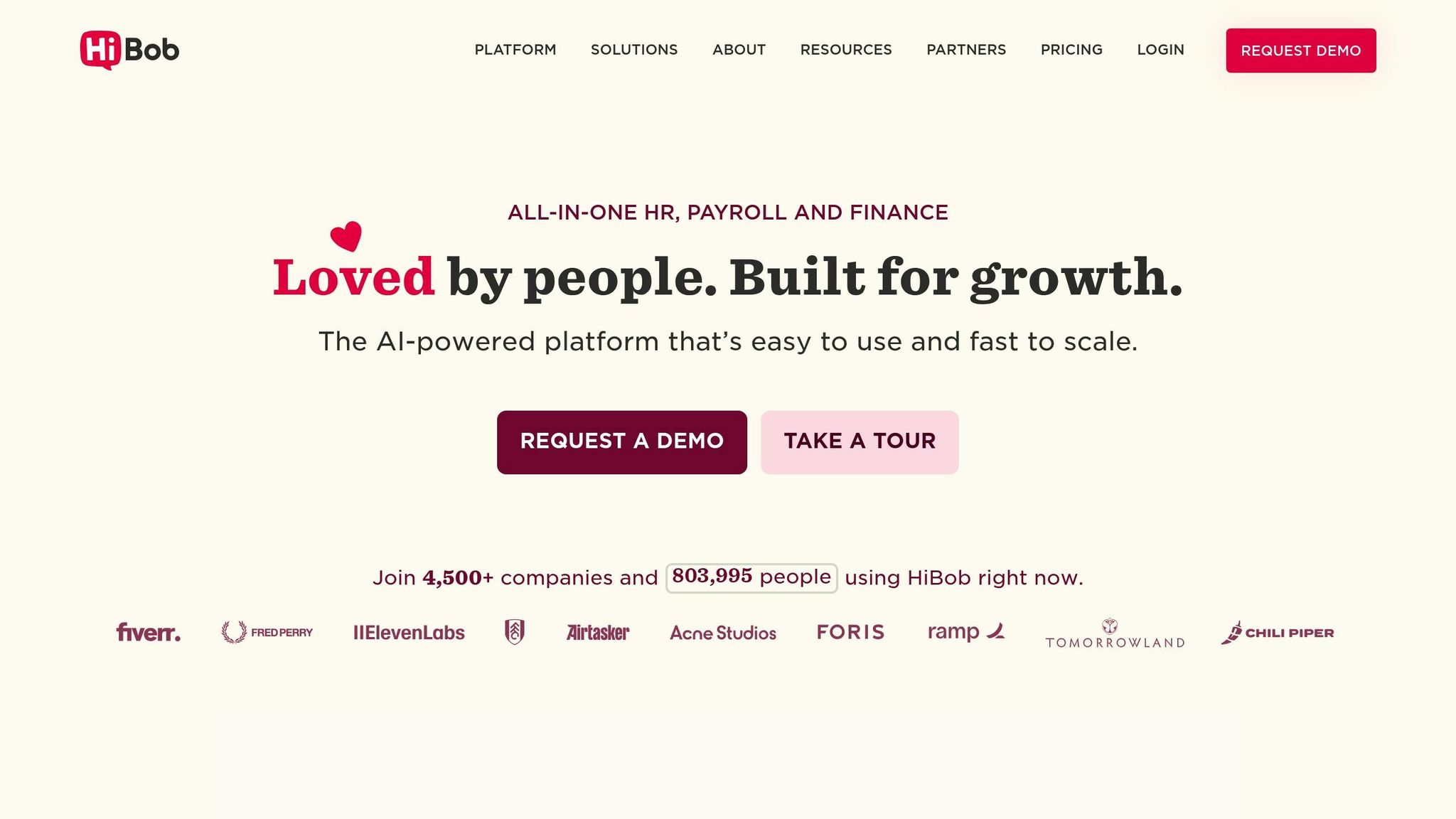Personio Review 2026: A Deep Dive Into Features, Pricing, and Competitors

Looking for the right HR software for your business? Personio, a Munich-based platform, is a top choice for small and mid-sized businesses (SMBs) in 2026. It simplifies HR processes by combining recruiting, payroll, performance tracking, and compliance tools into one system. With over 15,000 clients and a growing global presence, Personio continues to gain traction, especially in Europe.
Here’s a quick overview of what you’ll learn:
- Key Features: Personio offers tools for recruitment, onboarding, payroll, compliance (GDPR), and AI-powered assistance.
- Pricing: Subscription-based, estimated between $5–$15 per employee/month, with two main plans and optional add-ons.
- Best Fit: Ideal for European SMBs with 10–2,000 employees, focusing on compliance and scalability.
- Competitors: BambooHR (user-friendly for U.S. SMBs), HiBob (engagement-focused), and Rippling (automation-heavy for global teams).
Quick Comparison:
| Platform | Strengths | Limitations |
|---|---|---|
| Personio | Compliance tools, broad features | Limited global reach |
| BambooHR | Easy setup, budget-friendly | Basic reporting, fewer features |
| HiBob | Employee engagement focus | Overwhelming for small teams |
| Rippling | Automation, global payroll | Complex setup, technical needs |
Choosing the right HR tool depends on your company’s size, location, and priorities. Dive deeper to see how Personio stacks up against its competitors.
Personio Detailed Independent Review | Personio Pros and Cons | Personio Alternatives

1. Personio
Personio is an HR platform tailored for small and mid-sized businesses aiming to streamline their human resources operations. By 2026, Personio has gained significant traction, serving over 15,000 clients and reaching a valuation of $8.5 billion [1]. With a workforce of more than 2,100 employees spread across Europe and New York City, the platform has become a key player in the HR tech industry.
Features and Capabilities
Personio stands out for its ability to manage the entire employee lifecycle on a single platform. From recruitment and onboarding to payroll, time tracking, performance management, and employee engagement, it consolidates multiple HR functions, helping businesses cut down on costs and operational complexity.
For companies operating in Europe, Personio includes compliance tools tailored to GDPR requirements. It also boasts ISO 27001 and 27017 certifications, ensuring enterprise-grade security standards.
A notable addition to the platform is the Personio Assistant, an AI-powered chatbot designed to enhance user experience. Built using machine learning and hosted on AWS servers in the EU, the assistant adheres to a strict zero-storage policy for personal data [2]. It offers features like generating custom reports, answering HR-related queries, and assisting with follow-up tasks such as drafting emails.
Personio also prioritizes integration and connectivity. The platform supports over 200 app integrations and includes a mobile app for employee self-service. For businesses expanding globally, Personio’s partnership with Remote enables clients to hire talent across 100+ countries while managing all employees within the same system.
Pricing and Plans
Personio uses a subscription-based pricing model, charging per user, per month, with discounts for larger teams. Pricing details aren’t available publicly, but estimates suggest costs range between $5 and $15 per employee per month [1]. All plans require a 12-month contract and include a one-time implementation fee.
The platform offers two main tiers:
- Core Plan: Includes essential HR tools like employee profiles, organizational charts for one legal entity, salary and time management, absence tracking, preliminary payroll, analytics, limited document handling, eSignature capabilities, and workflow automation.
- Core Pro Plan: Builds on the Core plan with advanced features such as unlimited legal entity management, position management, expanded document handling, workforce planning, OAuth, and integrations with tools like Okta and Microsoft Entra ID.
Personio also offers add-ons for specific needs, such as Recruiting, Surveys, Performance & Development, Compensation Management, Whistleblowing, Premium Support, and integrations like Xero.
Target Market Fit
Personio is designed primarily for small and medium-sized businesses transitioning from basic HR tools or consolidating multiple systems. It’s particularly well-suited to companies with European operations, thanks to its strong compliance capabilities and regional expertise. However, its growing global partnerships make it increasingly appealing to international businesses. Many customers report seeing a return on investment within a year [3].
The platform is ideal for businesses experiencing rapid growth, as it scales easily from small teams to mid-sized organizations without requiring a system overhaul. Companies that value having all HR functions in one cohesive platform often find Personio’s approach highly effective.
Customer Support
Personio offers a range of support options to help users maximize the platform’s potential. From onboarding assistance to ensure smooth implementation to online resources and direct customer service, the company provides robust support. Higher-tier plans include access to dedicated account managers, and businesses needing extra support can opt for the Premium Support add-on. This add-on includes features like additional account owners and a sandbox environment for testing configurations.
As Personio continues to grow globally, it’s also expanding its support infrastructure. However, the level of service can vary depending on the selected plan and the user’s location.
Next, we’ll compare Personio with BambooHR to explore how its offerings stack up in the competitive HR software market.
2. BambooHR

BambooHR is a well-regarded HR software platform tailored for small and mid-sized businesses in the U.S. Since its founding in 2008 and headquartered in Lindon, Utah, the platform has become known for its straightforward, user-friendly design. Let’s dive into its key features and see how it stacks up against Personio.
Features and Capabilities
BambooHR focuses on delivering core HR tools with a clean, intuitive interface, making it a go-to choice for businesses seeking simplicity. Here’s an overview of its main features:
- Centralized Employee Data: BambooHR simplifies HR management by organizing employee information, documents, and organizational charts in one easy-to-access location.
- Applicant Tracking System (ATS): The platform offers essential recruiting tools for job postings, candidate tracking, and managing the hiring process. However, its ATS is more basic, lacking the advanced candidate scoring and collaborative features that Personio provides.
- Time Tracking and PTO Management: Employees can submit self-service requests for time off, with automated notifications sent to managers. One drawback is that BambooHR doesn’t include built-in payroll processing, a feature Personio offers in certain markets.
- Performance Management: Tools for setting goals, conducting performance reviews, and generating reports are available. While these tools meet basic HR needs, they may fall short for larger organizations requiring more in-depth analytics.
- Integrations: BambooHR connects with popular tools like Slack and Microsoft Office 365. However, its integration options are more limited compared to Personio’s extensive suite of native integrations.
BambooHR’s focus on simplicity and core functionalities makes it a solid choice for smaller businesses. Up next, we’ll take a closer look at HiBob to see how it measures up in this competitive space.
3. HiBob

HiBob is an HR platform designed to simplify people management while enhancing engagement and productivity.
Features and Capabilities
HiBob shines with its sleek, user-friendly interface and flexibility to support onsite, remote, or hybrid work arrangements. It offers real-time analytics to help businesses make data-driven workforce decisions. The platform also integrates a wide range of HR processes, making it a robust tool for modern enterprises. That said, its extensive features might feel overwhelming for smaller companies with more straightforward HR needs.
Target Market Fit
HiBob takes a different approach compared to platforms like Personio, focusing on boosting employee engagement and fostering company culture rather than just automating processes. It’s a great fit for businesses that prioritize building a connected and engaged workforce. The platform is especially valuable for companies with diverse work environments that need a customizable system and real-time insights to guide their HR strategies. HiBob is ideal for organizations ready to go beyond basic HR functions and actively shape their workplace culture while driving productivity.
sbb-itb-88a7fe6
4. Rippling

Rippling stands out by combining HR, payroll, benefits, and IT management into a single, unified platform. This all-in-one approach is especially appealing for businesses aiming to simplify and connect various operational processes.
Features and Capabilities
Rippling's standout feature is its ability to automate workflows across different departments. For example, when a new hire joins the team, the platform takes care of everything: setting up payroll, creating IT accounts, enrolling them in benefits, and even provisioning necessary hardware. On the flip side, during offboarding, Rippling swiftly revokes access and initiates equipment recovery, ensuring a secure and efficient process.
The platform also supports global payroll, enabling companies to manage employees across multiple countries while ensuring compliance with local tax and labor laws. Benefits administration is another strong suit, covering health insurance, 401(k) plans, and other perks - all accessible through a single interface.
One feature that sets Rippling apart is its IT management capabilities. It handles device provisioning, software licenses, security permissions, and access controls. By integrating IT and HR functions, Rippling eliminates duplicate data entry and enhances security, allowing both teams to collaborate seamlessly within the same system.
Target Market Fit
Rippling’s robust features make it an excellent choice for global and tech-savvy teams that require smooth integration between HR, payroll, benefits, and IT management [1]. It’s particularly well-suited for companies with distributed workforces or those with complex operations that demand close coordination across departments.
Unlike Personio, which primarily targets small to medium-sized European businesses with 10 to 2,000 employees, Rippling appeals to companies that prioritize automation and often operate on an international scale. Remote and hybrid teams, in particular, benefit from Rippling’s ability to manage everything from laptop provisioning to compliance with international payroll standards.
However, Rippling’s extensive feature set can come with a learning curve. For businesses with simpler HR needs, the platform’s setup and technical requirements might feel overwhelming. Up next, we’ll take a closer look at the advantages and challenges these platforms present.
Advantages and Disadvantages
Below is a breakdown of the advantages and drawbacks of each platform, designed to help you identify the one that aligns best with your business needs.
Each HR platform has its own strengths and weaknesses, making it easier for businesses to choose based on their size, goals, and operational focus.
Personio is a well-rounded solution tailored for European companies, especially those dealing with intricate compliance regulations. Its growing popularity highlights its appeal in this market [1]. The platform is particularly effective for mid-sized companies with 200–2,000 employees, where it has seen the most success [4].
That said, Personio’s strong European focus can be limiting for companies with a global presence. For instance, while its partnership with Remote allows hiring in over 100 countries [1], its global capabilities are still developing. Additionally, while onboarding is relatively straightforward, teams looking for instant productivity might find the initial setup a little slower than expected.
BambooHR is celebrated for its simplicity and user-friendly design, making it a go-to option for small U.S.-based businesses that need basic HR tools without unnecessary complexity. Its intuitive interface means minimal training is required, enabling quick adoption. However, it’s less suited for companies looking to scale, as it lacks advanced features like in-depth analytics, multi-country payroll, or complex workflow automation. Larger organizations may also find its reporting features too basic for their needs.
HiBob takes a modern, employee-focused approach, prioritizing engagement and workplace culture. Its sleek design and customizable features make it an attractive choice for businesses that want to align the platform with their specific processes. However, the high level of customization might feel overwhelming for smaller teams. Additionally, as a relatively newer player in the market, HiBob might not offer as many third-party integrations as its more established competitors.
Rippling excels in automation, seamlessly combining HR, IT, and finance operations. This integration removes repetitive data entry and creates efficient workflows across multiple departments. For tech-savvy companies managing remote teams, Rippling’s ability to handle everything from laptop provisioning to international payroll compliance is a major plus. On the flip side, its extensive features can feel overwhelming, requiring significant setup and technical know-how. Smaller businesses with simpler needs might find themselves paying for capabilities they don’t fully use, and non-technical users could struggle with the platform’s complexity.
The table below provides a quick comparison of each platform's strengths and limitations:
| Platform | Key Strengths | Main Limitations |
|---|---|---|
| Personio | Expertise in European compliance, broad feature set, 200+ pre-built integrations | Limited global reach, European-centric focus, initial learning curve |
| BambooHR | Easy to use, quick setup, budget-friendly for small teams | Limited scalability, basic reporting, fewer advanced features |
| HiBob | Engaging user experience, customizable, employee-focused | Overwhelming for small teams, fewer integrations, newer to the market |
| Rippling | Strong automation, HR-IT integration, global payroll | Complex setup, technical expertise required, potential overpayment for unused features |
These factors are essential when evaluating HR technology options. Your decision should hinge on your company’s size, global presence, technical expertise, and growth ambitions. For European SMBs, Personio’s compliance expertise stands out. Small U.S. businesses may prefer BambooHR’s simplicity, while Rippling’s automation appeals to tech-heavy companies with distributed teams. HiBob, meanwhile, is ideal for organizations placing a premium on employee engagement and culture.
Final Thoughts
When comparing these platforms, Personio stands out as a top choice for small and mid-sized businesses (SMBs) aiming to modernize their HR processes in 2026. Its well-rounded features and expertise in European regulations make it particularly appealing for companies with operations in Europe or those planning to expand into the region.
For growing SMBs, Personio offers an appealing mix of flexibility and growth potential. Its modular pricing structure allows businesses to start with essential HR tools and gradually add features like recruiting, performance management, or payroll. This pay-as-you-grow model ensures companies only invest in what they need while leaving room for future expansion. This adaptability gives Personio an edge, especially compared to platforms tailored to narrower regional or operational needs.
That said, Personio isn’t the perfect fit for everyone. U.S.-based companies may lean toward BambooHR for its straightforward and user-friendly approach, while businesses managing complex remote teams might appreciate Rippling’s automation capabilities, even if it requires more technical setup.
The HR software market in 2026 shows a clear trend: platforms succeed by specializing in specific niches rather than trying to be everything to everyone. Personio’s focus on European SMBs, BambooHR’s dedication to U.S.-based small businesses, HiBob’s emphasis on employee engagement, and Rippling’s automation-driven design all reflect this shift. Choosing the right platform means aligning your company’s unique needs with the strengths of the software.
Ultimately, your decision should reflect your company’s current goals and future plans. For mid-sized businesses with European operations or compliance concerns, Personio’s comprehensive features and regional expertise make it a compelling option. On the other hand, companies prioritizing simplicity or advanced automation across departments might find better fits with other platforms.
As HR software continues to evolve, Personio’s steady growth and feature updates position it as a dependable choice for SMBs looking to streamline their HR operations effectively.
FAQs
Why is Personio an ideal HR platform for small and mid-sized businesses in Europe?
Personio is specifically designed with European small and mid-sized businesses in mind, offering tools that align closely with EU labor laws and data protection standards. It simplifies handling region-specific HR tasks, including GDPR compliance and adherence to local labor regulations.
What sets Personio apart is its ability to manage the challenges of operating across multiple countries. This makes it an excellent option for businesses expanding within Europe. Its user-friendly interface and automation features help streamline HR processes, delivering efficiency without requiring the resources of a large enterprise.
How does Personio's AI-powered Assistant improve HR management for businesses?
Currently, there's no information indicating that Personio offers an AI-powered Assistant feature. If such a feature exists, it hasn't been publicly announced or included in the most recent documentation or reviews as of 2026. For the latest and most accurate details, it's best to visit Personio's official website or reach out to their support team directly.
What factors should a business consider when choosing between Personio's Core and Core Pro plans?
When deciding between Personio's Core and Core Pro plans in 2026, it's important to assess your HR priorities and overall organizational goals.
- Core Plan: This option works well for smaller teams or businesses that need essential HR tools. It includes features like employee profiles, document management, and absence tracking. If you're aiming to set up a straightforward HR system, this plan is a great starting point.
- Core Pro Plan: Tailored for growing organizations, this plan offers everything in the Core plan but adds more advanced features to handle complex HR tasks. It's designed to improve efficiency for larger teams managing more intricate processes.
To choose the right plan, think about the size of your team, how much automation you need, and the complexity of your HR workflows.
Related Blog Posts
Read also
Ready to get started?
If you want to dive into the details just Book a Free Consultation with our staff and we’ll be happy to answer your questions.





